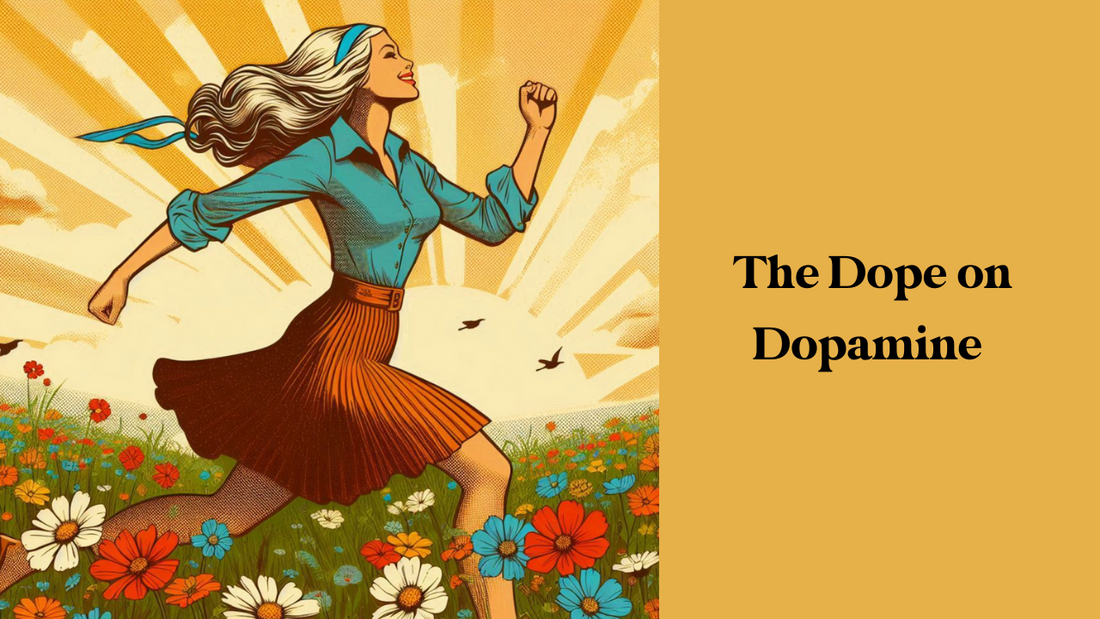
Dopamine Dynamics: Understanding Its Impact on Women in Midlife
Share
Dopamine, often called the "feel-good" neurotransmitter, is basically your body's own reward system. Think of it like your internal cheerleader, motivation coach, and mood manager all rolled into one. Dopamine plays a crucial role in our brain's reward system, motivation, and emotional regulation. For those of us navigating midlife and perimenopause, understanding dopamine becomes particularly important.
The Dope on Dopamine
Dopamine is a neurotransmitter that acts as a chemical messenger in the brain. It's responsible for transmitting signals between nerve cells and plays a starring role in:
- Motivation and goal-directed behavior. Read “ready to crush those goals!”
- Pleasure and reward sensations
- Motor control
- Emotional regulation
- Cognitive processes like attention and learning (think: focused and ready to go!)
Midlife's Dopamine Drama
As we hit perimenopause and menopause, our hormones start playing a wild game of musical chairs. Estrogen - which used to be friends with dopamine - starts dropping, and suddenly our brain chemistry is doing unexpected somersaults. And by somersaults, I mean dopamine imbalances.
Signs of Dopamine Imbalance
Too Little Dopamine:
- Persistent fatigue and low energy (think: dragging your legs through molasses all day)
- Decreased motivation and interest in activities – or anything, for that matter.
- Mood changes, including depression
- Difficulty concentrating (brain fog at its best)
- Reduced libido
- Sleep disturbances
- Increased risk of weight gain
Too Much Dopamine:
- Anxiety and restlessness. Your friends say (behind your back) that you make coffee nervous.
- You’re basically feeling wired, but not in a good way.
- Impulsive behaviors and decisions
- Potential addictive tendencies
- Sleep disruptions
- Increased risk of compulsive actions
- Potential mood instability
Managing Dopamine Levels
Women experiencing dopamine-related challenges can consider:
- Regular exercise to naturally boost dopamine (If dopamine could talk it would tell you it loves exercise!)
- Balanced nutrition with protein-rich foods
- Stress management techniques
- Quality sleep hygiene. Make sleep your number one job.
- Mindfulness and meditation practices
- Consider talking to a healthcare practitioner who ‘gets’ midlife hormones and won’t dismiss your concerns.
When to Seek Professional Help
Persistent symptoms of dopamine imbalance warrant consultation with healthcare professionals. What kind of professional? This is always a good question. Endocrinologists, gynecologists, and neurologists can provide comprehensive assessments and personalized treatment strategies.
Let’s Get Super-Sciencey - Diagnostic Considerations
- Comprehensive hormone panel
- Neurotransmitter testing
- Detailed medical history review
- Psychological assessment
Understanding dopamine's role in midlife empowers women to recognize potential imbalances and take proactive steps toward maintaining optimal neurological and emotional well-being.
The Real Talk
Your body is going through normal changes. Understanding dopamine can help you navigate this sometimes-unpredictable ride with more confidence and fewer surprises.
Pro tip: If something feels consistently off, don't Google yourself into a panic. Talk to a professional who can give you personalized advice.
Midlife isn't the time to slow down! We’re just getting started and we’re doing that by understanding our body's new rhythm and learning how to work with it. And dopamine? It's just one of the many ways your body communicates what it needs. At this age, we know that listening to our bodies is our best strategy for optimal health.
